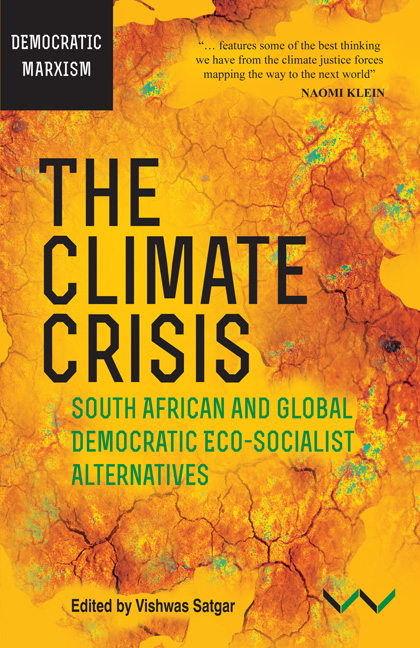Book contents
- Frontmatter
- Contents
- Tables and Box
- Acknowledgements
- Acronyms and Abbreviations
- Chapter 1 The Climate Crisis and Systemic Alternatives
- PART ONE THE CLIMATE CRISIS AS CAPITALIST CRISIS
- PART TWO DEMOCRATIC ECO-SOCIALIST ALTERNATIVES IN THE WORLD
- Chapter 4 The Employment Crisis, Just Transition and the Universal Basic Income Grant
- Chapter 5 The Rights of Mother Earth
- Chapter 6 Buen Vivir: An Alternative Perspective from the Peoples of the Global South to the Crisis of Capitalist Modernity
- Chapter 7 Challenging the Growth Paradigm: Marx, Buddha and the Pursuit of ‘Happiness’
- Chapter 8 Ubuntu and the Struggle for an African Eco-Socialist Alternative
- Chapter 9 The Climate Crisis and the Struggle for African Food Sovereignty
- PART THREE DEMOCRATIC ECO-SOCIALIST ALTERNATIVES IN SOUTH AFRICA
- CONCLUSION
- Contributors
- Index
Chapter 8 - Ubuntu and the Struggle for an African Eco-Socialist Alternative
from PART TWO - DEMOCRATIC ECO-SOCIALIST ALTERNATIVES IN THE WORLD
Published online by Cambridge University Press: 05 June 2019
- Frontmatter
- Contents
- Tables and Box
- Acknowledgements
- Acronyms and Abbreviations
- Chapter 1 The Climate Crisis and Systemic Alternatives
- PART ONE THE CLIMATE CRISIS AS CAPITALIST CRISIS
- PART TWO DEMOCRATIC ECO-SOCIALIST ALTERNATIVES IN THE WORLD
- Chapter 4 The Employment Crisis, Just Transition and the Universal Basic Income Grant
- Chapter 5 The Rights of Mother Earth
- Chapter 6 Buen Vivir: An Alternative Perspective from the Peoples of the Global South to the Crisis of Capitalist Modernity
- Chapter 7 Challenging the Growth Paradigm: Marx, Buddha and the Pursuit of ‘Happiness’
- Chapter 8 Ubuntu and the Struggle for an African Eco-Socialist Alternative
- Chapter 9 The Climate Crisis and the Struggle for African Food Sovereignty
- PART THREE DEMOCRATIC ECO-SOCIALIST ALTERNATIVES IN SOUTH AFRICA
- CONCLUSION
- Contributors
- Index
Summary
I am not a prisoner of history. I should not seek there for the meaning of my destiny. I should constantly remind myself that the real leap consists in introducing invention into existence. In the world through which I travel, I am endlessly creating myself. I am a part of Being to the degree that I go beyond it. (Fanon 1967: 179)
Nowhere is the quest for an ecologically just existence more urgent than in Africa, a continent hovering on the brink of ecocide after centuries of subjugation of its people and looting of its riches. This chapter argues that Africa's worldview and philosophy, known as ubuntu in southern Africa, embodies an ecological ethics that could inspire green socialist imaginaries in the battle against climate change. As a living ethics, ubuntu demands an activism of solidarity and decolonisation in the face of what Vishwas Satgar terms an ‘imperial ecocide’ (see Satgar in this volume).
Ecological socialism (eco-socialism hereafter) and ubuntu are both held as unfinished, evolving and aspirational projects (Cornell & Van Marle 2015; Kovel 2011). Both strive for more inclusive, egalitarian and ecocentric solutions to contemporary crises. It is argued that despite the failure of historic attempts to fuse ubuntu and socialism into endogenous post-capitalist projects, compelling reasons remain for reopening a conversation about their complementarity. As this chapter aims to illustrate, an ubuntu ethics has already played midwife to the radical notion of post-extractivism, that is, leaving behind for future generations the fossil fuels and minerals that drive destructive capitalist accumulation and its crises, notably climate change.
Ubuntu is understood as an Africa-wide ethical paradigm that, notwithstanding regional versions, is practised widely across sub-Saharan Africa (Chuwa 2014). As an ethics of interrelationships, situated in a communitarian social fabric of caring and sharing, ubuntu may equal, and even exceed, socialist notions of a ‘radical egalitarianism’ (Cornell 2009; Cornell & Van Marle 2015). An emerging consensus holds that ubuntu cannot be compatible with capitalist relations, the commodification of nature or inequality. The first endogenous attempts at systemising a political economy of African philosophy – the work of scholar-leaders Amilcar Cabral, Leopoldt Senghor, Frantz Fanon and Julius Nyerere, among others – still hold potential (Chuwa 2014; Metz 2014a) for a more communitarian ecological paradigm.
- Type
- Chapter
- Information
- Climate Crisis, TheSouth African and Global Democratic Eco-Socialist Alternatives, pp. 168 - 189Publisher: Wits University PressPrint publication year: 2018



